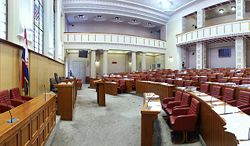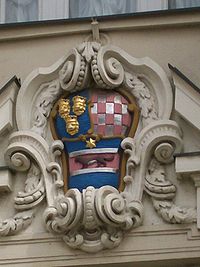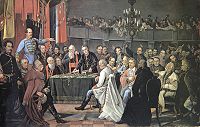- Parliament of Croatia
-
"Sabor" redirects here. For other uses, see Sabor (disambiguation).
Hrvatski sabor
Croatian Parliament
Type Type Unicameral Leadership Speaker Luka Bebić, Croatian Democratic Union
since 11 January 2008Members 153 Political groups Croatian Democratic Union (65)
Social Democratic Party of Croatia (55)
Croatian People's Party – Liberal Democrats (7)
Croatian Peasant Party (6)
Istrian Democratic Assembly (3)
Croatian Democratic Alliance of Slavonia and Baranja (3)
Independent Democratic Serb Party (3)
Croatian Social Liberal Party (0)
Croatian Party of Pensioners (1)
Croatian Party of Rights (1)
Party of Democratic Action of Croatia (1)
Independent (6)Elections Last election 25 November 2007 Meeting place 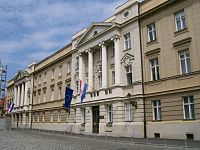
Parliament Palace, Zagreb Website www.sabor.hr The Parliament of Croatia (Croatian: Hrvatski sabor) is the unicameral legislature of Croatia. Under the terms of the Croatian Constitution, the Sabor[1] represents the people and is vested with the legislative power.
The Sabor is composed of between 100 and 160 members, elected on the basis of direct universal and equal suffrage by secret ballot, for a term of 4 years. Members' mandate can be extended only during a war. Seats are allocated according to the Croatian Parliament electoral districts - most representatives come from the Croatian mainland counties, but there are also some minority and diaspora seats. Currently the number of members is 153. 140 of them are from the counties, 8 from the minorities and 5 from abroad. The Sabor is presided by a President (sometimes referred to as Speaker or Chairman), who is assisted by at least one deputy president (usually four or five).
Powers of the Parliament
The Croatian Parliament (Sabor):
- decides on the enactment and amendment of the Constitution
- passes laws
- adopts the state budget
- decides on war and peace
- passes documents which express the policy of the parliament
- adopts the Strategy of national security and the Strategy of defense of the Republic of Croatia
- realizes civil control over the armed forces and the security services of the Republic of Croatia
- decides on alternations of the borders of the Republic of Croatia
- calls referendums
- carries out elections, appointments and reliefs of office, in conformity with the Constitution and law
- supervises the work of the Government of the Republic of Croatia and other holders of public authority responsible to the Croatian Parliament, in conformity with the Constitution and law
- grants amnesty for criminal offenses
- conducts other affairs as specified by the Constitution
The Croatian Parliament (Sabor) makes decisions by majority votes provided that a majority of representatives are present at the session.
Laws which regulate the rights of national minorities, decision of crossing the borders or acting over the borders by the armed forces, altering the borders are passed by the Croatian Parliament by a two-thirds majority vote of all representatives.
Laws which elaborate the constitutionally defined human rights and fundamental freedoms, the electoral system, the organization, authority and operation of government bodies and the organization and authority of local and regional self-government are passed by the Croatian Parliament by a majority vote of all representatives.
Each representative of the Croatian Parliament, the parliamentary clubs of representatives and the working bodies of the Croatian Parliament, and the Government of the Republic of Croatia have the right to propose laws.
Members of the Croatian Parliament have the right to ask the Government of the Republic of Croatia and individual ministers questions.
At least one tenth of the representatives of the Croatian Parliament may submit an interpellation on the operation of the Government of the Republic of Croatia or some of its individual members.
The Croatian Parliament may form commissions of inquiry regarding any issue of public interest.
Composition
Croatia 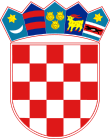
This article is part of the series:
Politics and government of
CroatiaConstitutionLegislative- Sabor
- Speaker
- Assembly
- Opposition
JudiciaryExecutive- President (List)
- Ivo Josipović
- Government (List)
- Prime Minister
- Jadranka Kosor
- Cabinet
- Prime Minister
- Croatian Democratic Union (HDZ)
- Social Democratic Party (SDP)
- Croatian People's Party -
Liberal Democrats (HNS-LD) - Croatian Peasant Party (HSS)
- Istrian Democratic Assembly (IDS)
- Croatian Democratic Alliance
of Slavonia and Baranja (HDSSB) - Croatian Social Liberal Party (HSLS)
- Croatian Party of Pensioners (HSU)
- Croatian Party of Rights (HSP)
Divisions
Composition as of 2011[update]
- Croatian Democratic Union (HDZ) - 65
- Parliamentary club of the Social Democratic Party - 55
- Social Democratic Party of Croatia (SDP) - 54
- independent - 1
- Croatian People's Party-Liberal Democrats (HNS) - 7
- Croatian Peasant Party (HSS) - 6
- Croatian Democratic Alliance of Slavonia and Baranja (HDSSB) - 3
- Istrian Democratic Assembly (IDS) - 3
- Parliamentary club of Independents - 3
- independents (former HSLS members) - 3
- Croatian Party of Rights (HSP) - 1
- Croatian Pensioners' Party (HSU) - 1
- Parliamentary club of National Minorities - 8
- Party of Democratic Action of Croatia (SDA HR) - 1
- Independent Democratic Serb Party (SDSS) - 3 [2]
- independent - 4
- Independents - 2
Historical background
The Croat nobles agreed to form two Croatian states after settling in the Illyrian territory in the 7th century AD, after the great migration of the Slavs. Their meeting and agreement over the issues important for the people is considered the foundation of Croatian parliament.
Croatian counts and dukes later established a country and elected a king among themselves in the 9th and 10th century, but the legend says that they always made decisions as a group.
After Croatia decided to elect Hungarian king as King of Croatia in 1102, these nobles formed a real parliament and their decisions had significant influence in the state politics. In fact, when the Kingdom of Hungary and Kingdom of Croatia lost its leader after the Battle of Mohács in 1526 when the king Louis II of Hungary died, the Croats gathered at Parliament on Cetin and chose Austrian archduke Ferdinand I. Habsburg for King of Croatia.
In 1712, the Croatian Parliament decided on the so-called Pragmatic Sanction, thus taking the side of Maria Theresa, supporting her to become queen of Hungary.
In the light of the Revolutions of 1848, Sabor decided to renew some of the country autonomy by exerting its power to all of the old Croatian regions and having the same ban govern them. In 1868 they negotiated a bargain with the Hungarians that regulated the ties between the countries in the new environment of Austria-Hungary.
In 1918 the Parliament decided to split off Croatia from Hungary, and join the State of Slovenes, Croats and Serbs. However, the country's entry to the Kingdom of Serbs, Croats and Slovenes that ensued was never ratified by Sabor, which was decommissioned.
In 1942, an unelected Croatian State Parliament was held in the Independent State of Croatia, a puppet state of Nazi Germany. It met for the first time on February 23, 1942 and was formally dissolved on December 28, 1942. Its president was Marko Dosen. The post-World War II parliament developed from the council of anti-fascists (ZAVNOH) formed in 1943. It functioned as the Parliament of the Socialist Republic of Croatia (as a part of Socialist Federal Republic of Yugoslavia), until 1990 when Croatia regained full independence.
Bicameral system 1990-2001
Under the original terms of the 1990 Constitution, the Croatian Parliament was bicameral, comprising the directly elected Zastupnički Dom (Chamber of Deputies) and the Županijski Dom (Chamber of the Counties).[3] Such a chamber - which held a suspending veto power over legislation - was composed of 3 members for each of the 21 districts of the Country, regardless of their population. In addition, it included five members appointed by the President of the Republic and the former Heads of State themselves (similar to the Italian Senate). The Chamber of the Counties was abolished in 2001 with a formal constitutional amendment[4] and the Chamber of Deputies is now known simply as the Sabor.
List of Presidents (Speakers) of the Parliament
Since Croatian independence which was proclaimed on June 25, 1991 and entered in force fully on December 8, 1991.
- Žarko Domljan May 30, 1990 - September 7, 1992
- Stjepan Mesić September 7, 1992 - May 24, 1994
- Nedjeljko Mihanović May 24, 1994 - November 28, 1995
- Vlatko Pavletić November 28, 1995 - February 2, 2000
- Zlatko Tomčić February 2, 2000 - December 22, 2003
- Vladimir Šeks December 22, 2003 - January 11, 2008
- Luka Bebić January 11, 2008 – Present
List of Presidents (Speakers) of the Chamber of Counties of the Parliament
- Josip Manolić 1993 - 1994
- Katica Ivanišević 1994 - 2001
Elections for the Parliament
Last election
Summary of the 25 November 2007 Croatian Parliament (Hrvatski sabor) election results Parties and coalitions Votes % Seats % +/– Croatian Democratic Union (Hrvatska demokratska zajednica) 907,743 36.6 66 43.1 ±0 Social Democratic Party of Croatia (Socijaldemokratska partija Hrvatske) 775,690 31.2 56 36.6 +22 "Green-Yellow Coalition" (Zeleno-žuta koalicija) Croatian Peasant Party (Hrvatska seljačka stranka) 161,814 6.5 6 3.9 –4 Croatian Social Liberal Party (Hrvatska socijalno liberalna stranka) 2 1.3 ±0 Alliance of Primorje-Gorski Kotar (Primorsko-goranski savez) 0 0.0 –1 Democratic Party of Zagorje (Zagorska demokratska stranka) 0 0.0 — Zagorje Party (Zagorska stranka) 0 0.0 — Croatian People's Party – Liberal Democrats (Hrvatska narodna stranka - Liberalni demokrati) 168,440 6.8 7 4.6 –4 Istrian Democratic Assembly (Istarski demokratski sabor/Dieta democratica Istriana) 38,267 1.5 3 2.0 –1 Croatian Democratic Alliance of Slavonija and Baranja (Hrvatski demokratski savez Slavonije i Baranje) 44,552 1.8 3 2.0 +3 Coalition Croatian Party of Pensioners (Hrvatska stranka umirovljenika) 101,091 4.1 1 0.7 –2 Democratic Party of Pensioners (Demokratska stranka umirovljenika) 0 0.0 — Croatian Party of Rights (Hrvatska stranka prava) 86,865 3.5 1 0.7 –7 Others 184,477 7.4 0 0.0 –7 Independent Democratic Serb Party (Samostalna demokratska srpska stranka) (national minority list) Enrolments and vote totals do not include voters for ethnic minority representatives. 3 2.0 ±0 Party of Democratic Action of Croatia (Stranka Demokratske Akcije Hrvatske) (national minority list) 1 0.7 ±0 Other national minority representatives 4 2.6 ±0 Total 2,483,452 100.0 153 100 — Sources: State Election Committee[5] Main article: Croatian parliamentary election, 2007Past elections
- Croatian parliamentary election, 1990
- Croatian parliamentary election, 1992
- Croatian parliamentary election, 1995
- Croatian parliamentary election, 2000
- Croatian parliamentary election, 2003
List of assemblies
- 1st assembly (1990–1992)
- 2nd assembly (1992–1995)
- 3rd assembly (1995–1999)
- 4th assembly (2000–2003)
- 5th assembly (2003–2007)
- 6th assembly (2008–2011)
See also
Notes
- ^ Note: the Croatian word Sabor is used only for the Croatian parliament. For the parliaments of other countries, Croatian speakers use the words parlament (parliament) or skupština (assembly).
- ^ Normal representative can be a member of only one deputy club, but representative of national minorities can be the member of the Deputy club of his party and the member of Deputy club of National Minorities if that is acceptable for his party.Hrvatski sabor - English, Hrvatski sabor - Croatian.
- ^ Hrvatski sabor
- ^ Sénat - International - Senates of the world - Chili
- ^ Official results "Službeni rezultati izbora za zastupnike u hrvatski Sabor [Official results of elections of representatives to the Croatian Parliament]" (PDF). State Election Committee. 22 December 2007. http://www.izbori.hr/2007Sabor/rezultati/rezultati_izbora_sluzbeni.pdf Official results. Retrieved 8 November 2011.
External links
Parliament of Europe Sovereign
states- Albania
- Andorra
- Armenia
- Austria
- Azerbaijan
- Belarus
- Belgium
- Bosnia and Herzegovina
- Bulgaria
- Croatia
- Cyprus
- Czech Republic
- Denmark
- Estonia
- Finland
- France
- Georgia
- Germany
- Greece
- Hungary
- Iceland
- Ireland
- Italy
- Kazakhstan
- Latvia
- Liechtenstein
- Lithuania
- Luxembourg
- Macedonia
- Malta
- Moldova
- Monaco
- Montenegro
- Netherlands
- Norway
- Poland
- Portugal
- Romania
- Russia
- San Marino
- Serbia
- Slovakia
- Slovenia
- Spain
- Sweden
- Switzerland
- Turkey
- Ukraine
- United Kingdom
- (England
- Northern Ireland
- Scotland
- Wales)
States with limited
recognition- Abkhazia
- Kosovo
- Nagorno-Karabakh
- Northern Cyprus
- South Ossetia
- Transnistria
Dependencies
and other territories- Åland
- Faroe Islands
- Gibraltar
- Guernsey
- Jan Mayen
- Jersey
- Isle of Man
- Svalbard
Other entities - European Union
Coordinates: 45°48′58″N 15°58′28″E / 45.81611°N 15.97444°E
Categories:- Politics of Croatia
- Government of Croatia
- Parliaments by country
- Unicameral legislatures
Wikimedia Foundation. 2010.

